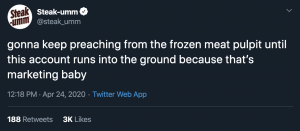You can surprise your audience not only by what you say, but by the very fact that you’re the one saying it. Let’s call it the Steak-umm Effect. The cultural relevance of this 50-year-old relic of the prepackaged food industry was as thin and frozen as its product until a couple of weeks ago, when its Twitter feed went way off script and caused a sensation.

Just after Easter, Steak-umm’s Twitter account announced that “during this crisis, we are committed to: 1.) providing factual, helpful information; 2.) bridging our cultural polarization; and 3.) helping people who are helping people.” This message came during a series of shockingly frank, decidedly noncommercial tweets which, over the next week or so, grew increasingly complex in their sociological, economic, and political thinking until they reached a level of philosophical inquiry usually reserved for college humanities theses.
Instead, this message comes from a company that made no bones about reminding its followers, on April 10, “We are just a frozen meat brand with a bottom line.” Since then, Steak-umm has been flying out of freezers in grocery stores, which can barely keep the stuff stocked, and the company’s Twitter account has increased its followers by 40 percent in a week and a half.
The lesson for communicators may be this: What is no one expecting you to say right now? And the content of that message: how can it ring out in ways that everyone will want to hear it?
